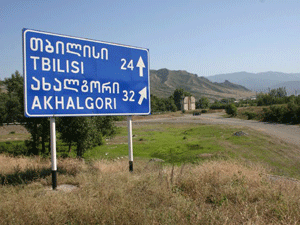Shorena Latatia
About 7 700 people lived in Akhalgori district before the armed conflict in August of 2008. As a result of the military operations, Russian armies deployed in the district; however, unlike other districts of the former autonomous republic of South Ossetia, mass ethnic cleansing did not take place in Akhalgori district. Currently, the Law of Georgia on Occupied Territories work for the district and according to it, there is emergency situation in Akhalgori district.
Conflict scientist Paata Zakareishvili said that the de-facto authority of the so-called South Ossetia choose the policy of reintegration instead ethnic cleansing in Akhalgori district towards Georgian population. The purpose of their policy is propagandist and aims to gain the favor of the international community. “In the current situation, the government of Georgia had two alternatives – either to support Russian propaganda and empty the district from Georgian population (which could be useful for future) or to hinder the propaganda and take all measures to keep the Georgian population in Akhalgori district. Unfortunately, the government of Georgia chose the last one.”
Nowadays, most Akhalgori residents with the IDP status live in Tserovani (4 416 persons); another part lives in Prezeti (840) and in Tsilkani (1 188). 730 families prefered to get compensation of 10 000 USD instead a cottage in a new settlements but only 51 families received it as the Akhalgori district deputy governor Gia Tsituri said.
“If an enterprise is opened in Tserovani settlement, they initially employ IDPs from Akhalgori district and then us. Most of Akhalgori residents are kind of “holiday makers” here – they have received a cottage in Tserovani but still live in Akhalgori; they arrive here only in winter. However, they get the same allowances like we do,” said an IDP from the village in Liakhvi Gorge in her conversation with the Human Rights Center.
Gia Tsituri said 460 IDPs from Akhalgori district work in the public agencies in Tserovani. He does not know how many people work in the private companies; however, their number is not small.
Paata Zakareishvili said “the government works with double standards. The allowances are granted based on personal sympathies that blatantly violate the law and the constitution.”
82-year-old Irakli Kenkadze lived in the village of Largvisi together with his disabled wife before the armed conflict in 2008. “I applied for the compensation from the very beginning. They promised us to give compensation in near future. Today, I was told at the ministry that since my son has already taken compensation, I should live with him. However, I had my separate house and I deserve separate compensation.”
The representative of the Ministry of IDPs from the Occupied Territories, Accommodation and Refugees Giorgi Shengelia stated in his interview with the Human Rights Center that Kenkadze and his son received one house and now we prefer to assist those IDPs who had separate house but did not receive compensations.
In order to clarify the situation the Human Rights Center got in touch with Gia Mtsituri who confirmed that Irakli Kenkadze permanently lived in his house in the village of Largvisi and his son lived in a separate house several kilometers away. The compensation received by his son should not have reflected Kenkadze’s compensation.”
Like Kenkadze, many other residents of Akhalgori remained without status and compensation. One of them reported to the Human Rights Center that if he pays 3 000 USD, the ministry will grant him the status without any problems. “I have neither 3 000 USD to pay in advance nor I have a wish to share my compensation with anybody,” said a resident of Akhalgori district who is waiting for the compensation for a long time.
The Human Rights Center got in touch with the Akhalgori district administration in order to clarify the exact date for issuing the compensation. The district administration only confirmed that certain people really deserved compensation but exact date was not estimated yet.
Finally, the commission set up in the ministry is authorized to settle the issue of compensation-granting. However, the Human Rights Center could not clarify the exact date for issuing the compensations neither with the commission members.
“We are discussing the submitted applications now and I cannot tell you when this process will finish,” stated the commission member Giorgi Shengelia.
“I have visited the ministry in Tbilisi for the tenth time but they cannot tell me when I will receive compensation. I pay 10 GEL for the transportation each time; though there is no result yet,” said Piruzi Oghadze from Akhalgori district.
Ethnic Georgian citizens of Akhalgori district travel around Akhalgori by their Georgian IDs translated into Russian; however, according to the recent information, de-facto government of South Ossetia started to distribute local passports.
“I will not definitely take the passport of the de-facto government of South Ossetia.
My life will lose sense if I will not be able to visit my children and grandchildren in Tbilisi. However, my ancestors have graves in Akhalgori and I cannot leave them either,” said Irakli Kenkadze. Nevertheless, there are people who have not decided yet to take the passports of the de-facto authority.
News
December 13, 2023
Ethnic minorities outside the peace dialogue
November 6, 2023
‘Peace’ agenda of political parties
Popular
Articles
February 13, 2024




